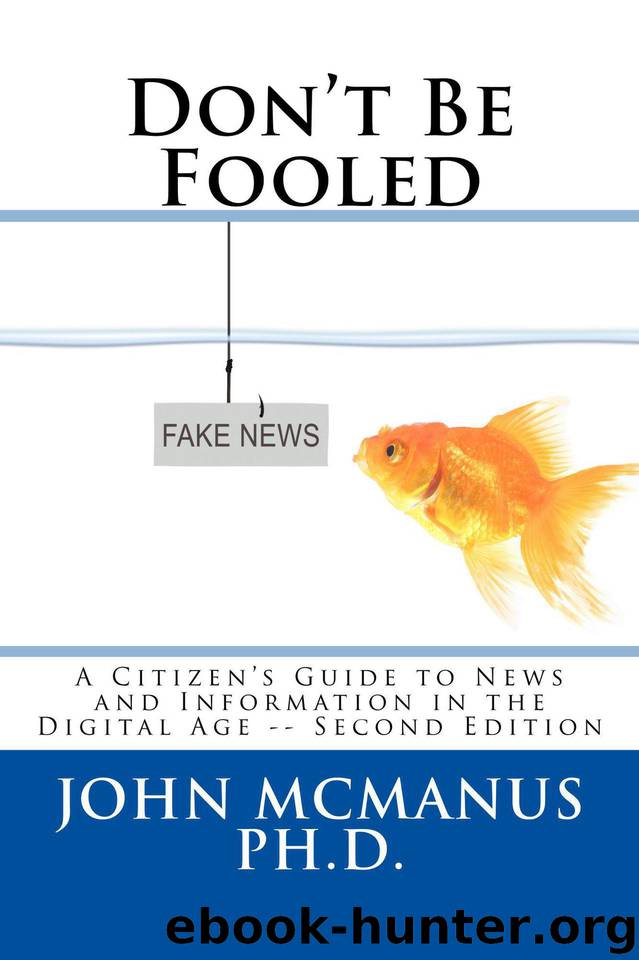Don't Be Fooled: A Citizen's Guide to News and Information in the Digital Age by McManus John

Author:McManus, John [McManus, John]
Language: eng
Format: epub
Publisher: The Unvarnished Press
Published: 2018-02-09T16:00:00+00:00
Calvin and Hobbes (used with permission)
Content designed to entertain
An entertainer may, but need not, adhere to facts. Logic, evidence, and fairness matter little. Exaggeration, even absurdity, are common. Emotion, however, is essential. To be successful, entertainment has to move you, even if it's just a smile or cringe. Dramatic images and music are carefully selected and sequenced.
It's tempting to overlook entertainment as a motivation because its primary function is to enthrall us and what it describes is often openly fictitious. But as the English social philosopher/nanny Mary Poppins observed, "a spoonful of sugar makes the medicine go down." Entertainment can leap-frog our rational faculties to exert powerful social effects, including fooling us.
Lauren Feldman, a communication professor at American University explained: “When audiences are exposed to political humor or satire, they are less likely to oppose the information in the message or question whether it is fair or accurate. Ultimately, it can affect the perceptions of a candidate.”19
Novels, plays, motion pictures, and cartoons often inform and persuade as well as entertain. Prior to the American Civil War, Harriet Beecher Stowe's widely read account of the brutality of slavery in Uncle Tom's Cabin made the practice real – and repugnant – to Northerners. In 1862, Ms. Stowe met President Abraham Lincoln who reportedly quipped, "So you're the little woman who wrote the book that started this great war!"20 American Studies Professor David S. Reynolds called it "the most influential novel in American history and a catalyst for radical change both at home and abroad."21
To avoid being fooled, it's useful to subject satire and fiction to a modified version of the same criteria used for establishing the reliability of news and other information presented as factual. Even if the characters and setting are fictional, do they fairly illustrate the reality they purport to describe? We can ask, for example, how Ms. Stowe learned about plantation life (by looking at her online biography). Was she free of conflicts of interest? Was her primary purpose to entertain or inform, or to persuade? We can also apply the remainder of the SMELL test.
What Evidence is provided to support the thesis or gist of the story or message?
Some information-providers possess the confidence of the framers of the Constitution: They believe what they assert as true to be self-evident. They make naked assertions, offered as if there is no need to attribute a claim of fact to an authoritative source, nor to assemble evidence for generalizations.
When providers offer no source or evidence for their claims, we have no choice but to fall back on our assessment of the provider's own credibility and, if mediated, the reputation of the institution on whose pages, airwaves or website the information appears. A distinguished professor writing within his/er expertise for a news outlet that forbids conflicts of interest and checks facts may merit trust, but we should be skeptical of less qualified information-providers, particularly if they are working outside of institutions with a reputation for integrity. As a former journalist whose wary
Download
This site does not store any files on its server. We only index and link to content provided by other sites. Please contact the content providers to delete copyright contents if any and email us, we'll remove relevant links or contents immediately.
| Anthropology | Archaeology |
| Philosophy | Politics & Government |
| Social Sciences | Sociology |
| Women's Studies |
120 Days of Sodom by Marquis de Sade(3262)
The Outpost: An Untold Story of American Valor by Jake Tapper(2553)
The Room Where It Happened by John Bolton;(2150)
Putin's Labyrinth(2016)
Operation Paperclip by Annie Jacobsen(1996)
Savage Harvest by Carl Hoffman(1955)
Thank You for Being Late by Thomas L. Friedman(1766)
A Very Stable Genius by Philip Rucker & Carol Leonnig(1666)
The Pirates of Somalia by Jay Bahadur(1623)
The Flight of the Intellectuals by Berman Paul(1501)
Gideon's Spies by Gordon Thomas(1500)
Extraordinary, Ordinary People by Condoleezza Rice(1494)
Tell by Major Margaret Witt(1438)
Art of Betrayal by Gordon Corera(1429)
Master the Civil Service Exams by Peterson's(1417)
A Warning by Anonymous(1415)
Pirates of Somalia by Jay Bahadur(1381)
A Long Way Gone: Memoirs of a Boy Soldier by Ishmael Beah(1380)
Love Wins by Debbie Cenziper(1357)
